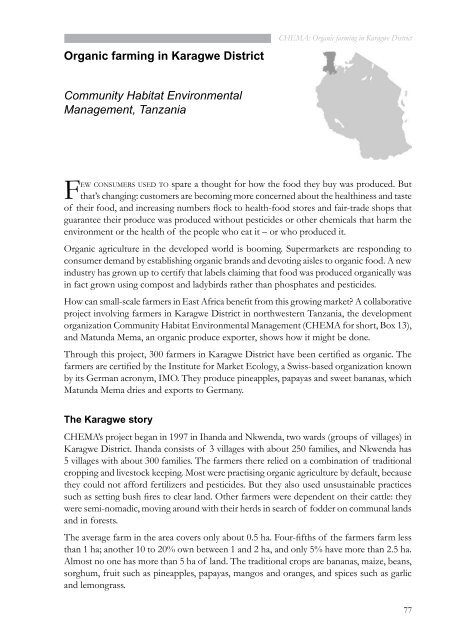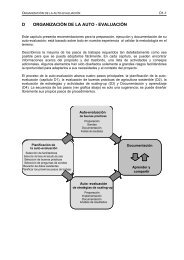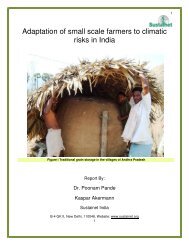cases from tanzania - Sustainet
cases from tanzania - Sustainet
cases from tanzania - Sustainet
Create successful ePaper yourself
Turn your PDF publications into a flip-book with our unique Google optimized e-Paper software.
organic farming in Karagwe District<br />
Community Habitat Environmental<br />
Management, Tanzania<br />
CHEMA: Organic farming in Karagwe District<br />
eW consumers used to spare a thought for how the food they buy was produced. But<br />
Fthat’s<br />
changing: customers are becoming more concerned about the healthiness and taste<br />
of their food, and increasing numbers flock to health-food stores and fair-trade shops that<br />
guarantee their produce was produced without pesticides or other chemicals that harm the<br />
environment or the health of the people who eat it – or who produced it.<br />
Organic agriculture in the developed world is booming. Supermarkets are responding to<br />
consumer demand by establishing organic brands and devoting aisles to organic food. A new<br />
industry has grown up to certify that labels claiming that food was produced organically was<br />
in fact grown using compost and ladybirds rather than phosphates and pesticides.<br />
How can small-scale farmers in East Africa benefit <strong>from</strong> this growing market? A collaborative<br />
project involving farmers in Karagwe District in northwestern Tanzania, the development<br />
organization Community Habitat Environmental Management (CHEMA for short, Box 13),<br />
and Matunda Mema, an organic produce exporter, shows how it might be done.<br />
Through this project, 300 farmers in Karagwe District have been certified as organic. The<br />
farmers are certified by the Institute for Market Ecology, a Swiss-based organization known<br />
by its German acronym, IMO. They produce pineapples, papayas and sweet bananas, which<br />
Matunda Mema dries and exports to Germany.<br />
the Karagwe story<br />
CHEMA’s project began in 1997 in Ihanda and Nkwenda, two wards (groups of villages) in<br />
Karagwe District. Ihanda consists of 3 villages with about 250 families, and Nkwenda has<br />
5 villages with about 300 families. The farmers there relied on a combination of traditional<br />
cropping and livestock keeping. Most were practising organic agriculture by default, because<br />
they could not afford fertilizers and pesticides. But they also used unsustainable practices<br />
such as setting bush fires to clear land. Other farmers were dependent on their cattle: they<br />
were semi-nomadic, moving around with their herds in search of fodder on communal lands<br />
and in forests.<br />
The average farm in the area covers only about 0.5 ha. Four-fifths of the farmers farm less<br />
than 1 ha; another 10 to 20% own between 1 and 2 ha, and only 5% have more than 2.5 ha.<br />
Almost no one has more than 5 ha of land. The traditional crops are bananas, maize, beans,<br />
sorghum, fruit such as pineapples, papayas, mangos and oranges, and spices such as garlic<br />
and lemongrass.<br />
77




